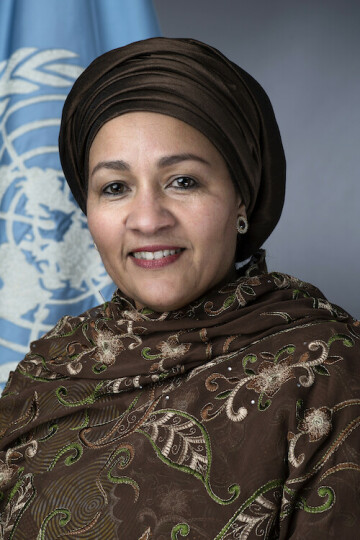Lucy to homo sapiens to humanity
 United Nations Deputy Secretary General Amina Mohammad
United Nations Deputy Secretary General Amina Mohammad
Are we advancing from the sunshine of a growing brain to brain fog?
About 3.18 million years ago one of our first relatives fell out of an African tree where she was hiding from predators, ran away on two legs and lived to die another day. Lucy’s skeleton was found on November 24, 1974. She was found by two anthropologists looking for fossils. They named the three-and-one-half-foot tall female weighing about 65 pounds after celebrating the discovery of the hominid with a few drinks. Her wisdom teeth were slightly worn so she was an adult –with a small brain in a small skull.
Researchers have not determined the mode of death because her bones had not been gnawed by predators. Read her biography some time. She’s a fascinating broad.
The three-hundred-thousand years of homo sapiens history is absolutely fascinating when you have an idea how much we have grown and how much we have remained the same in those three million years. In many ways we are homo saps. We can be sap that carries life-giving fluids to tree limbs or human organs, or we can be a dupe or fool.
In our latest studies of our zoological family Hominidae, after we split from the apes, our brains are probably twice as large as Lucy’s and presently studying our latest mental problems: brain fog, social media, Post-Traumatic Stress Disorder (PTSD) among both children and adults, and the chaos of distrust among almost everybody on earth.
We have made progress. Just think. Only 500 years ago the continent of Europe was split into more than 5,000 pieces of gang turf, generally called “baronies,” that were ruled by “nobles,” warlords and knights, some who were “saps” and terrorized peasants and spent their lives raiding each other.
There was a distinct shortage of progressive Homo sapiens. Some European countries have been decent places for peasants to live in for hundreds of years. Others have been turned into what are called s—t-holes today. In eastern Congo, 120 gangs create chaos and Haiti is not governable today because 300 gangs kill the governments and each other.
The problem is, creating the institutions that enable us to trust each other is a very difficult assignment for both homo sapiens and human saps. We need to advance to the next level of Homo “Something.” We have the brawn, we just don’t have big enough brains yet.
Medical experts say even kids are getting PTSD these days
For decades most medical authorities thought that only military troops who experienced mortal combat later suffer from PTSD – which is very difficult to treat. The Divided States of America Surgeon General Vivek Murthy has asked Congress to pass a law requiring all social media – and particularly Instagram, Tik Tok and Facebook – to place warning labels on all online social media stating that they have not been proven safe for adolescents.
He claims the evidence shows that adolescents who spend as much as five hours a day on social media are at great risk for experiencing anxiety. He is a member of a multiagency task force set up by the administration to examine the problem. He says education may be the answer.
Labels on cigarette packs have helped reduce the use of tobacco from 40% of the population in the 1980s to 12% in 2023. \Murthy adds: “What we need is something clear that people can see regularly when they use social media that tells them, frankly, what happens when they are overused. I learned in medical school that in an emergency, you don’t have the luxury to wait. The scientific evidence regarding excessive use is overwhelming.”
The European Union, Britain and many other governments have already passed laws setting up rules for use by young people. We do have more than a dozen states that have passed guardrails around children’s use and the requirement that parents give permission before use.
The medical community has come up with a simple but fascinating term for excessive use of cellphones and anything with computer screens: brain rot!
The symptoms: inability to focus on a subject, productivity drop-off, increased agitation and anxiety levels, negative reactions to normal activities, depression, lethargy, disorientation, and increased use of alcohol and drugs. All are signs and causes of digital information overload.
I have been accused of suffering from brain rot for many years. As a principal of an elementary school for 11 years and two high schools for another 11 years, I wrote weekly memos to school staffs about new research, events, meetings and calendar. After retiring I have written weekly columns for various outlets for 31 years. That comes to 53 years and millions of words.
A martini a day may keep the brain surgeon away!
I will admit I have a martini every day for two reasons. For the first reason, I am saluting my favorite idol and actor W.C. Fields. At age 10, he was helping his father sell milk and oranges off a horse-drawn cart on the streets of Philadelphia. While sitting in the cart he would juggle oranges to pass the time. He became so skilled he was signed by a promoter and at age 18 was in London, England, juggling things on a theater stage for the king and queen.
He then went to Hollywood where he starred in David Copperfield of Charles Dickens fame. He was such an attraction that movie moguls had him fill out his contracts with his own salary figures and became a very rich man.
He loved martinis and had a couple each day. He had a marvelous sense of humor. When asked why he didn’t like to drink water, he said in shocked fashion: “Don’t you know what fish do in water?”
He was not a religious man, but when he was on his death bed, a friend came to his bed and caught him reading the Bible. He said: “Bill! You’re not a believer! Why are you reading the Bible?” Bill said: “I’m looking for loopholes.”
For my second reason, I think a martini every day might prevent brain rot.
Here is one definition of brain rot by a medical staff: “Brain rot is caused by excessive technology use. That might mean binge-watching videos on YouTube, scrolling social media, or switching back-and-forth between browser tabs. On top of that, you might be simultaneously surfing the internet, texting and checking your e-mail. Ther end result: you’re stimulating your brain. And when you’re digitally inundating yourself with too much information, you’re at risk of brain rot. Scrolling through social media platforms spikes the neurochemical dopamine, which produces feelings of satisfaction and pleasure. The more you do it the more you want to do it. Your brain associates scrolling with a feeling of gratification, even when you’re aware of its negative consequences. In this way, scrolling becomes a behavioral addiction. This process is also called Zombie Scrolling which is the mindless habitual scrolling with no destination in mind of benefit derived. When zombie scrolling, you vacantly stare at your smart phone as you flit from one feed to another.”
There, you have it. Feel better now? I do read five national newspapers on the internet each day, broken by taking sips from an extra-dry martini.
W.C. Fields kept a thermos filled with martinis on the movie set which he claimed was filled with lemonade. During camera breaks he always sipped his “lemonade.” One day the camera crew dumped his martinis and filled the thermos with lemonade. Later, during a break, he took a sip, glared, and shouted: “Who in hell put lemonade in my lemonade?”
‘Twas said the laugh was heard throughout the huge movie set. And Bill never had a foggy idea.
U.N. humanitarian chief says world leaders are not “human!” Yet!
Martin Griffiths, who has served for three years as the United Nations Humanitarian Chief, has published an essay in The New York Times, saying that most of our present world leaders have failed miserably as Homo sapiens and human beings because many are committing war crimes violating Geneva Conventions and international treaties approved decades ago. He is using his experiences covering was zones for many years.
His committee has determined that at least 120 million people have become refugees just in the last three years. He cites Ethiopia, where five million people have been cut off from the outside world by a brutal civil war since 2021. Russia’s invasion of Ukraine in February of 2022 has featured summary executions of civilians in the streets and sexual violence against women in towns and villages, the relentless destruction of homes, apartments, malls and, in some cases, the destruction of complete small towns and cities – so far.
Millions of Ukrainians have become refugees.
The war in Sudan, started in 2023 between two angry generals, has killed thousands, displaced millions, and cajused a major famine. The Palestinians and the Israelis have had 76 years to learn to live close to one another, but have acted like international Hatfields and McCoys in a multi-generation feud, except they rape and murder concertgoers, babies, nursing mothers with 2,000-pound bombs, thousands of rockets, tanks, mine, and every other weapon known to man.
Whenever Arabs or Jews would begin to agree to a two-state solution, Jewish leaders would build more settlements on Palestinian land and Arab leaders would protest and kill more Jews. I got so disgusted with both parties over the decades I finally thought they deserved each other.
Is there a leader in the Middle East, Europe or Asia who has not committed war crimes in Syria, Yemen, Myanmar, Democratic Republic of the Congo, Russia, Ukraine and other chaotic countries such as Haiti and Venezuela?
Perhaps it’s time to replace male Homo sap world leaders with female Homo sapiens world leaders who have not committed war crimes – and probably never will. Think of all the gentle, loving, well-organized elephant herds led by females while the bulls are running around committing war and sexual crimes from herd to herd.
Should we try the other half of Homo sapiens as world leaders?
The United Nations deputy secretary general is a woman named Amina Mohammad who is from Nigeria but spent her early life in Great Britain. She is the highest-ranking woman in the United Nations and has strong views about what should be done to improve health, working and living standards in many countries of the 140 in the United Nations.
Appointed in 2017, she has served the same length of time as the UN Humanitarian Chief, and has definite ideas about the role of women in government: “We’re half the population. And what we bring to the table is incredibly important and it’s missing. I think it’s why mostly our human development indices are so bad, why we have so many conflicts, and we are unable to come out of the conflicts. Flexing muscle and testosterone often dominates at tables around the world. This win, win, win at all costs – I think that would change if women were at the table.”
I think she is right.
